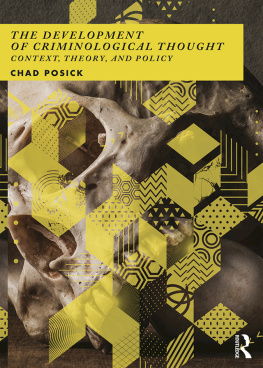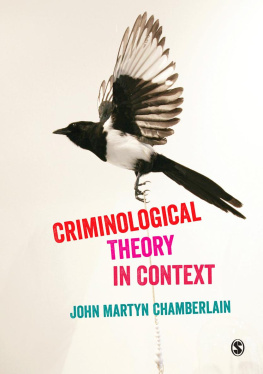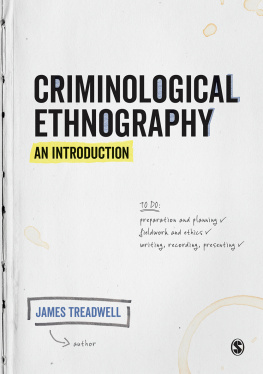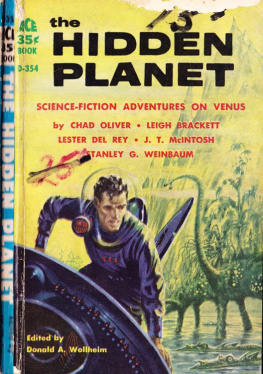Chad Posick - The Development of Criminological Thought
Here you can read online Chad Posick - The Development of Criminological Thought full text of the book (entire story) in english for free. Download pdf and epub, get meaning, cover and reviews about this ebook. year: 2018, publisher: Routledge, genre: Romance novel. Description of the work, (preface) as well as reviews are available. Best literature library LitArk.com created for fans of good reading and offers a wide selection of genres:
Romance novel
Science fiction
Adventure
Detective
Science
History
Home and family
Prose
Art
Politics
Computer
Non-fiction
Religion
Business
Children
Humor
Choose a favorite category and find really read worthwhile books. Enjoy immersion in the world of imagination, feel the emotions of the characters or learn something new for yourself, make an fascinating discovery.
- Book:The Development of Criminological Thought
- Author:
- Publisher:Routledge
- Genre:
- Year:2018
- Rating:4 / 5
- Favourites:Add to favourites
- Your mark:
- 80
- 1
- 2
- 3
- 4
- 5
The Development of Criminological Thought: summary, description and annotation
We offer to read an annotation, description, summary or preface (depends on what the author of the book "The Development of Criminological Thought" wrote himself). If you haven't found the necessary information about the book — write in the comments, we will try to find it.
The Development of Criminological Thought — read online for free the complete book (whole text) full work
Below is the text of the book, divided by pages. System saving the place of the last page read, allows you to conveniently read the book "The Development of Criminological Thought" online for free, without having to search again every time where you left off. Put a bookmark, and you can go to the page where you finished reading at any time.
Font size:
Interval:
Bookmark:
- A discussion of how major theorists came to espouse their ideas and how the social context of the time influenced the development of criminological thought;
- An exploration of the scientific method and the way in which theories are tested;
- Details of the origins of each theory as well as their recent developments in scholarship and research;
- Comparative and international research in theory;
- The empirical support for theory and the relationship between research and policy;
- Biosocial and developmental criminology, including the biosocial underpinnings of criminal behavior and the influence of neuroscience and brain psychology;
- Theoretical applications for explaining different crime types, such as genocide, white-collar crime, and environmental crime;
- A summary of the current state of criminological knowledge and a vision for the future of criminology.
Professor in the Department of Sociology, Iowa State University, USA, and Editor-in-Chief of Journal of Criminal Justice
Associate Professor of Justice Administration, University of Louisville, USA

by Routledge
2 Park Square, Milton Park, Abingdon, Oxon OX14 4RN
711 Third Avenue, New York, NY 10017
A catalogue record for this book is available from the British Library
Names: Posick, Chad, author.
Title: The development of criminological thought: context, theory and
policy / Chad Posick.
Description: Abingdon, Oxon; New York, NY: Routledge, 2018. | Includes
bibliographical references and index.
Identifiers: LCCN 2017042460| ISBN 9781138190504 (hardback) | ISBN
9781138190511 (pbk.) | ISBN 9781315640976 (ebook)
Subjects: LCSH: CriminologyHistory.
Classification: LCC HV6021 .P67 2018 | DDC 364dc23
LC record available at https://lccn.loc.gov/2017042460
by Apex CoVantage, LLC
- 01 Science, theory, and empirical investigation
- Introduction
- Science and theory
- The scientific method
- Elements of a theory
- Micro and macro theory
- Theory and underlying assumptions of human behavior
- Theory science, and paradigms
- Summary
- 02 Pre-Enlightenment theories
- Introduction
- Theory
- Classical Greek and philosophical perspectives
- Pagan perspectives
- Christian and monotheistic perspectives
- Naturalistic perspectives
- The Enlightenment and the emergence of contemporary criminology
- The case of Abigail Williams: the 11-year-old witch
- Empirical support
- Remaining questions
- Policy
- Summary
- 03 Lombroso and early biological theories
- Introduction
- Theory
- Origins
- Recent developments
- The cases of Carrie Buck and Abdelmalek Bayout: the genetic basis of crime
- Empirical support
- Remaining questions
- Policy
- Summary
- 04 The city and social disorganization theories
- Introduction
- Theory
- Origins
- Recent developments
- The case of Rochester, New York: a great city with great problems
- Empirical support
- Remaining questions
- Policy
- Summary
- 05 Anomie and strain theories
- Introduction
- Theory
- Origins
- Recent developments
- The case of Tanya Mitchell: the stressed killer
- Empirical support
- Remaining questions
- Policy
- Summary
- 06 Differential association and social learning theories
- Introduction
- Theory
- Origins
- Recent developments
- The case of the Boston Marathon bombing: learning crime and terrorism
- Empirical support
- Remaining questions
- Policy
- Summary
- 07 Labeling and critical criminology
- Introduction
- Theory
- Origins
- Marxism
- Labeling
- Recent developments
- Peacemaking
- Left realism
- Feminist criminology
- Green criminology
- Queer criminology
- The case of Brock Allen Turner: sexual assault and violence against women at Stanford
- Empirical support
- Remaining questions
- Policy
- Summary
- 08 Social and self-control theories
Font size:
Interval:
Bookmark:
Similar books «The Development of Criminological Thought»
Look at similar books to The Development of Criminological Thought. We have selected literature similar in name and meaning in the hope of providing readers with more options to find new, interesting, not yet read works.
Discussion, reviews of the book The Development of Criminological Thought and just readers' own opinions. Leave your comments, write what you think about the work, its meaning or the main characters. Specify what exactly you liked and what you didn't like, and why you think so.










